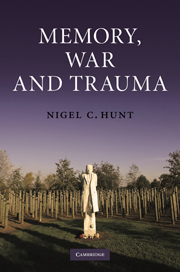Book contents
- Frontmatter
- Contents
- Preface
- 1 Background and purpose
- 2 Historical perspective
- 3 Methods and ethics
- 4 Current theory: post-traumatic stress disorder
- 5 Approaches to understanding trauma
- 6 Positive outcomes of traumatic experiences
- 7 Memory and history
- 8 Personal narrative and social discourse
- 9 Illustrating narrative as a scientific technique: the role of social support
- 10 Ageing, trauma and memory
- 11 Literature and trauma
- 12 Memorialisation and commemoration
- 13 Battlefield tours
- 14 Conclusions and future directions
- References
- Index
10 - Ageing, trauma and memory
Published online by Cambridge University Press: 05 June 2012
- Frontmatter
- Contents
- Preface
- 1 Background and purpose
- 2 Historical perspective
- 3 Methods and ethics
- 4 Current theory: post-traumatic stress disorder
- 5 Approaches to understanding trauma
- 6 Positive outcomes of traumatic experiences
- 7 Memory and history
- 8 Personal narrative and social discourse
- 9 Illustrating narrative as a scientific technique: the role of social support
- 10 Ageing, trauma and memory
- 11 Literature and trauma
- 12 Memorialisation and commemoration
- 13 Battlefield tours
- 14 Conclusions and future directions
- References
- Index
Summary
I used to think what landmines have I tripped over now … There's nothing to be seen but if you tread on the bugger it goes up.
Normandy veteran, 1994This chapter examines the very long-term effects of war. Central to this is a study I carried out a few years ago with WWII veterans (Hunt, 1997; Hunt and Robbins, 2001a, b). It addresses the extent and nature of war-related distress experienced by the veteran population, and the factors that predict such distress. The effects of traumatic stress on the older population are exacerbated by developmental changes, which in themselves are stressors. These include diminished sensory capacity, reduced mobility, frailty, reduced income and social status due to retirement, loss of friends and subsequent isolation, ill health and reduced self-care (Cook, 2001), though many people do not experience significant decline in their cognitive abilities, and many develop special expertises. Major physical and mental decline often does not occur until very advanced age (Coleman, 1999).
War has very long-term or permanent effects (Hunt, 1997; Spiro et al., 1994; Bramsen and van der Ploeg, 1999), though some of the symptoms may be less marked than in younger people (Fontana and Rosenheck, 1998). For instance, dissociation may be less persistent over time (Yehuda et al., 1995). There may also be complications involving coexistent syndromes, or different patterns of symptoms; for instance, Goenjian et al.
- Type
- Chapter
- Information
- Memory, War and Trauma , pp. 140 - 160Publisher: Cambridge University PressPrint publication year: 2010



